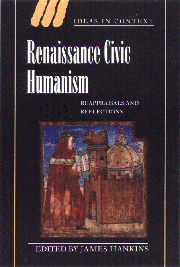Book contents
- Frontmatter
- Contents
- List of contributors
- Introduction
- 1 The republican idea
- 2 “Civic humanism” and medieval political thought
- 3 Civic humanism and Florentine politics
- 4 The two myths of civic humanism
- 5 Rhetoric, history, and ideology: the civic panegyrics of Leonardo Bruni
- 6 De-masking Renaissance republicanism
- 7 Civic humanism, realist constitutionalism, and Francesco Guicciardini's Discorso di Logrogno
- 8 Bruni and Machiavelli on civic humanism
- 9 Rhetoric, reason, and republic: republicanisms – ancient, medieval, and modern
- 10 Situating Machiavelli
- Index of manuscripts and archival documents
- General index
- Ideas in context
5 - Rhetoric, history, and ideology: the civic panegyrics of Leonardo Bruni
Published online by Cambridge University Press: 06 October 2009
- Frontmatter
- Contents
- List of contributors
- Introduction
- 1 The republican idea
- 2 “Civic humanism” and medieval political thought
- 3 Civic humanism and Florentine politics
- 4 The two myths of civic humanism
- 5 Rhetoric, history, and ideology: the civic panegyrics of Leonardo Bruni
- 6 De-masking Renaissance republicanism
- 7 Civic humanism, realist constitutionalism, and Francesco Guicciardini's Discorso di Logrogno
- 8 Bruni and Machiavelli on civic humanism
- 9 Rhetoric, reason, and republic: republicanisms – ancient, medieval, and modern
- 10 Situating Machiavelli
- Index of manuscripts and archival documents
- General index
- Ideas in context
Summary
Dum patriam laudat, damnat dum Poggius hostem,
Nec malus est civis, nec bonus historicus.
Jacopo Sannazaro, Epigr. I. 20I am afraid I shall have to bore the reader slightly by relating, in the first part of this essay, some dull but necessary information about the context, content and reception of two orations by Leonardo Bruni: the Laudatio Florentinae urbis and the Oratio in funere Ioannis Stroze. As is well known, these are the two most widely cited texts in modern discussions of Florentine civic humanism. Together with the De militia (On Knighthood), they are practically the only texts by Bruni read by historians of political thought. After that I hope things will get rather more interesting. I want to show in some detail the relationship between the rhetorical form and the historical (or rather unhistorical) character of these texts. My contention will be that both texts have been misunderstood because modern readers have not sufficiently appreciated the rhetorical conventions they assume and have not troubled to situate them in the context of Bruni's other works. This done, it will be clear, I believe, why the old dichotomy, “civic humanist or professional rhetorician?” that has bedeviled Bruni scholarship since the 1960s is fundamentally anachronistic. In closing, I shall question whether “civic humanism”, at least as it has been defined by Hans Baron and J.G.A. Pocock, is the best term to describe Bruni's humanism.
- Type
- Chapter
- Information
- Renaissance Civic HumanismReappraisals and Reflections, pp. 143 - 178Publisher: Cambridge University PressPrint publication year: 2000
- 11
- Cited by



